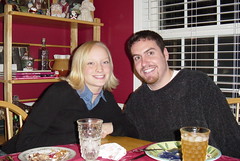What a restful and enjoyable weekend. Spent time with friends, played Monopoly, watched Napoleon Dynamite for the third time and finished some reading I needed to do. ("Your mom goes to college") The only problem was I have developed some throat dryness due to drainage and Spring-like weather in Winter. Because of these factors, I have an extremely low voice and was belting out some "Berry White" type bass at church yesterday and this morning in the shower. Wonder what my clients will think when they hear me on the phone today? Maybe I should serenade them with a little ballad "Can't Get Enough of Your Love Baby."
I have been meaning to journal about this but never knew what to say about it. Up to this point I still don't know what to say. So here goes...On my way home from work last week, I pulled out of the parking lot and was proceeding to turn right onto 8th Avenue. I noticed a man walking up the street from the corner of my eye. There was nothing unusual about this man, yet I felt like I knew him. The line to turn right began to shorten. While my mind is usually preoccupied with news from NPR or hoping I don't fall asleep on the Interstate, I could not escape the haunting image of the man I saw walking up the sidewalk. I glanced back and studied his face, all the while not trying to let him see me. "Who was he?" I thought. My memory searched its database for an answer, a picture, a clue, something to let me know who this man was and how I knew him. Again, another car turned right making the line even shorter and pushing me towards the stop sign. Finally it clicked. My search was over. It was Billy.
Several years ago while I was still a student at MTSU, I decided to stop going to church on Wednesday nights to be fed and do a little feeding myself. I followed a friend of mine (John Erickson) out to Nashville one night to an empty, dimly lit, abandoned hospital parking lot on the South side of Nashville. A church called Green Street Church of Christ, mainly made up of Lipscomb college students, would drive out to this parking lot and feed those that needed a meal. Their interactions with the homeless community would go far beyond a meal with the homeless one night a week, but this was my baptism into their world. Their ministry was coined with the phrase used by the Apostle Paul in his letter to the Corinthian church: Fools for Christ. To be honest, I was not comfortable with the idea of sitting down with someone who had been through a world of experience that I may never know of. What did I have in common with these people? Why would they want to talk to me? I have a car, rent money to pay for my apartment, food in my cabinet, not to mention the other stuff that invades my life that I see as "worthy." How can I relate to them? All this changed when I meet a man named Billy.
I felt comfortable with Billy even though he seemed reclusive by sitting by himself away from the crowd. Sitting by the fence on the cold hard parking lot cement, we talked for what seemed to be a long time. He wore life on his face with the thick lines that displayed a weathersome journeyman's travels. We spoke about Nashville, the music industry, Bob Dylan, traveling throughout the United States, politics, our childhoods. It was as if he and I were comrades in another life somewhere and we were reuniting from the ashes to check how the other was doing. Billy was one of the many faces I encountered on Wednesday nights under a Nashville sky. During my several months attending this gathering, I served food to those who were hungry, laughed with them, prayed with them, gave them rides, listened to them as well as shared with them. I meet a lot of people. Some I wouldn't remember, others I couldn't forget. Billy showed me that even though he was without a home or a job or the nice things we think we need, he was still human. That's a lesson that you can't find in any textbook.
I never saw Billy again until last week when I recognized him walking up the sidewalk near my workplace. I resent the fact that when it was my turn to turn right, I did. I left behind a man who still roams the streets without ever thanking him or acknowledging that I knew his name. His face still haunts the hallways of my mind, not in a negative manner, but as a reminder that all of humanity is just that, human. Thanks Billy.






 Well folks, I never thought I'd be saying this but......I have a cell phone. Yes I know, I know it's 2005 for goodness sake. No big deal to all you technology freaks out there. I used to live in a house back in my final years of college where my roommates and I would see how would be the last one to get a cell phone. It was between Daniel, T and myself. Daniel and T were the shoe-ins for sure I thought, no way they will get one before I do. I was engaged at the time and knew that my wife wanted me to have one in case of emergencies or other circumstances. She would get irritated by the fact that I was anti-cell phones and I would constantly make fun of our other roommate Dean for getting calls every three minutes on his cell. Time went on and T moved out of the house and landed a job delivering coffee. The company gave him a cell to use on the job but he could also use it on his personal time. Soon after, he got himself his own cell phone. Now the man I call T (Terry Wayne Harville), has 2, count em 2 cell phones. Then it was down to Daniel and me. I thought, Daniel is a good ole' country boy, he'll never get a cell phone. Sure enough, not long after T had his, Daniel purchases him a nice flip phone because he needed to be able to be reached for work purposes. So there I was, the last man standing. No cell phone in my pocket and I felt great. It's been a few years since we made that non-financial bet and now I am plugged into the matrix. I even had to have my wife show me how they work. I know that the green button answers and the red button hangs up. My wife and I'm sure my parents are glad that I have a cell phone. Hopefully I won't turn into those people you see on the interstate jabering on and on not paying attention to the road. Sheesh!
Well folks, I never thought I'd be saying this but......I have a cell phone. Yes I know, I know it's 2005 for goodness sake. No big deal to all you technology freaks out there. I used to live in a house back in my final years of college where my roommates and I would see how would be the last one to get a cell phone. It was between Daniel, T and myself. Daniel and T were the shoe-ins for sure I thought, no way they will get one before I do. I was engaged at the time and knew that my wife wanted me to have one in case of emergencies or other circumstances. She would get irritated by the fact that I was anti-cell phones and I would constantly make fun of our other roommate Dean for getting calls every three minutes on his cell. Time went on and T moved out of the house and landed a job delivering coffee. The company gave him a cell to use on the job but he could also use it on his personal time. Soon after, he got himself his own cell phone. Now the man I call T (Terry Wayne Harville), has 2, count em 2 cell phones. Then it was down to Daniel and me. I thought, Daniel is a good ole' country boy, he'll never get a cell phone. Sure enough, not long after T had his, Daniel purchases him a nice flip phone because he needed to be able to be reached for work purposes. So there I was, the last man standing. No cell phone in my pocket and I felt great. It's been a few years since we made that non-financial bet and now I am plugged into the matrix. I even had to have my wife show me how they work. I know that the green button answers and the red button hangs up. My wife and I'm sure my parents are glad that I have a cell phone. Hopefully I won't turn into those people you see on the interstate jabering on and on not paying attention to the road. Sheesh!







 one that didn't suggest any hugging would be happening in Johnny's future. The crowd was hushed with anxiety and anticipation. What will happen to Johnny and who the heck are his parents?
one that didn't suggest any hugging would be happening in Johnny's future. The crowd was hushed with anxiety and anticipation. What will happen to Johnny and who the heck are his parents?
